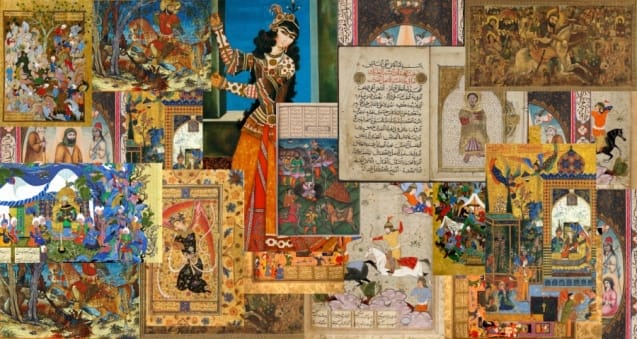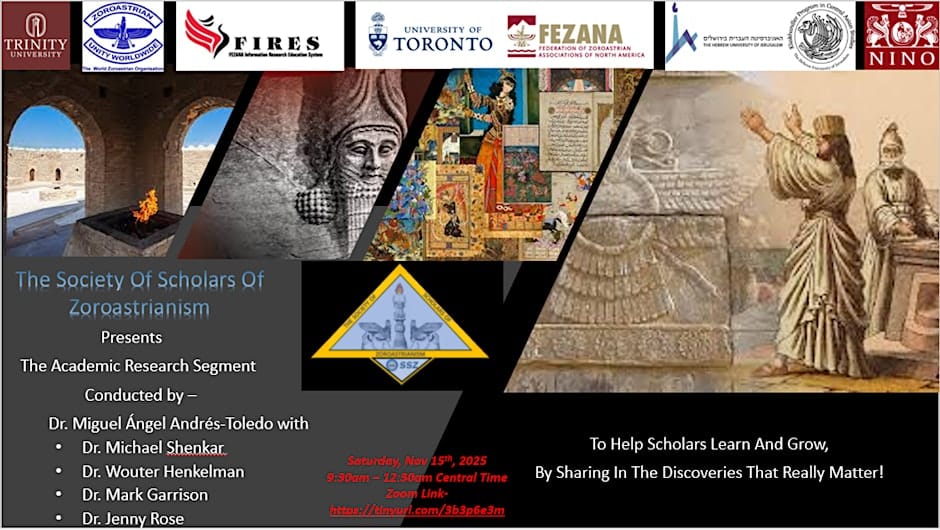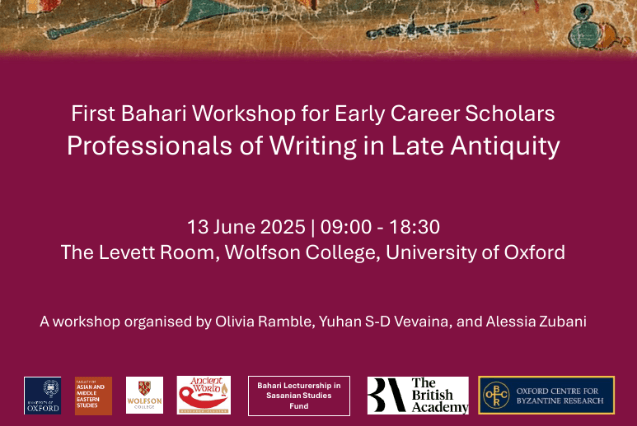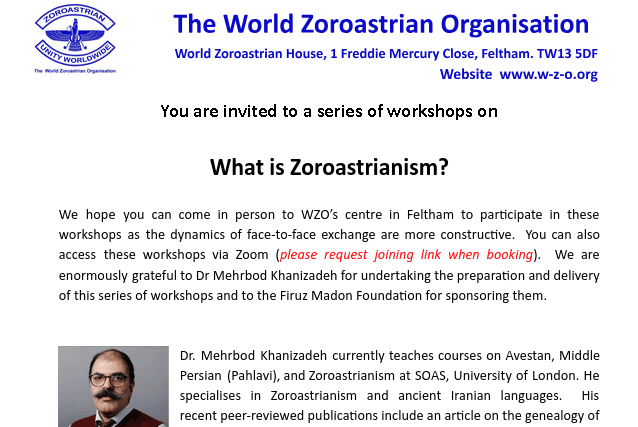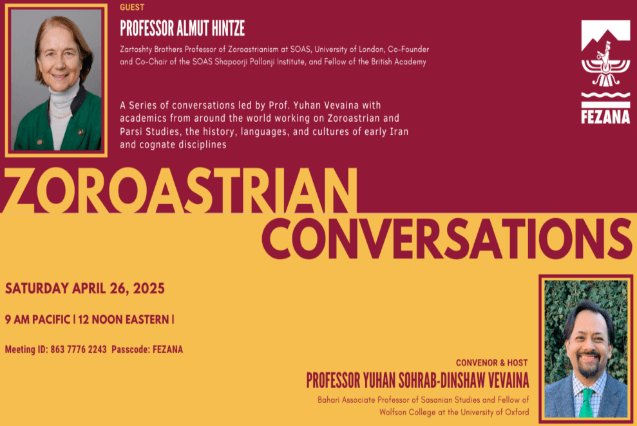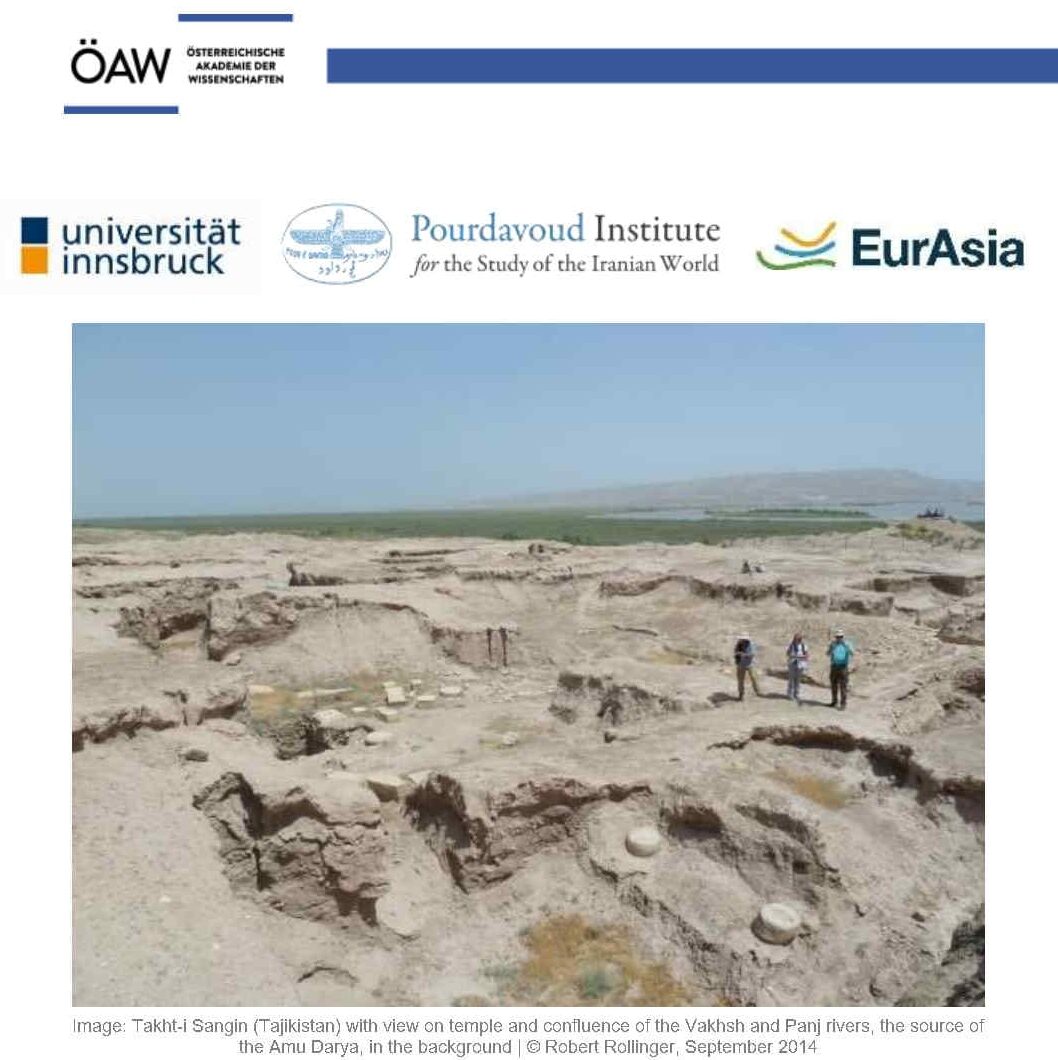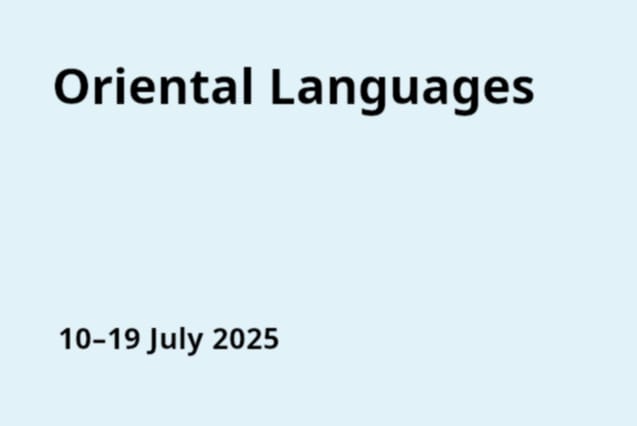ASPIRANTUM’s 2026 Persian Language Summer School offers 6–10 weeks (120–200 hours) of intensive Modern Persian instruction in Yerevan, beginning on June 21, June 28, or July 5, 2026. Classes at beginner, elementary, and intermediate levels focus on all key skills – reading, writing, speaking, listening, grammar, and vocabulary – with small groups ensuring meaningful progress.
Participants also take part in guided cultural excursions to Garni & Geghard, Aragats & Amberd Fortress, Ejmiatsin, Khor Virap & Noravank, Lake Sevan, along with culinary evenings, museum visits, and other cultural events.
Category: Events

Persian Language Summer School

The Academic Research Segment
The Society of Scholars of Zoroastrianism presents The Academic Research Segment.
The Academic Research Edition of the Society of Scholars of Zoroastrianism presents ‘a deep dive into the newest discoveries in the world of Zoroastrianism’. This is an online event taking place on 15 November 2025 from 3:30 to 6:30pm GMT.
Please visit this link for further details.
The participants are:
- Dr. Michael Shenkar: The Cult of Fire in Sogdiana; New Evidence from Sanjar Shah
- Dr. Miguel Andres Toledo: The Poetry of Ahura Mazdā’s Creation: Metrical Philosophy in Dēnkard 3
- Dr. Henkelman: The Achaemenids and Central Asia. The Evidence from the Persepolis Fortification Archive
- Dr. Garrison: The Zoroastrian Question in Achaemenid Fārs. Insights from the Persepolis Fortification Archive
The Pahlavi Papyri in their Historical Context

The Pahlavi Papyri in their Historical Context is the second round of the Pahlavi Papyri Workshop to be held in Innsbruck: Tuesday, 25 November – Wednesday, 26 November 2025. The workshop is organized by Bernhard Palme, Robert Rollinger and Touraj Daryaee.
Address: Seminar rooms 04K100/04M100 (4th floor) and 14 (1st floor), Ágnes-Heller-Haus, Innrain 52a, 6020 Innsbruck
To see the program, click here.

30 Years of “Iran and the Caucasus”: A Proud Milestone
International Conference Dedicated to the 30th Anniversary of Iran and the Caucasus
19-21 September, 2026
ArmeniaThe Editorial Board of Iran and the Caucasus, in collaboration with De Gruyter Brill, is pleased to announce an international conference marking the 30th anniversary of the journal’s founding.
Since its inception in 1997, Iran and the Caucasus has emerged as a leading interdisciplinary platform for scholarly engagement with the diverse historical, linguistic, literary, folkloric, textual, religious, archaeological, economic, and political dimensions of Irano-Caucasica—an expansive geo-cultural region extending from Asia Minor to the Indian subcontinent, encompassing Central Asia, Afghanistan and other territories historically situated within Greater Iran’s political orbit, inhabited by Iranian peoples, or profoundly influenced by Iranian cultural traditions including Northern Pakistan and the North Caucasus.
We extend a cordial invitation to scholars worldwide to contribute to this academic gathering by submitting papers that critically engage with the journal’s legacy, present original research consonant with its thematic scope, and articulate new analytical perspectives on the region’s historical trajectories, contemporary dynamics, and future perspectives.
Publication
Selected papers will be considered for publication, after undergoing peer review, in the journal Iran and the Caucasus or as a separate volume of the conference proceedings in the Series Iran and the Caucasus Monographs.
Individual and Panel Presentation Format
Abstract submissions must be anonymized and should not exceed 400 words. Submissions must be sent in both Word and PDF formats. A separate file should include the following information:
- Full name(s)
- Institutional affiliation(s)
- Email address(es)
- ORCID iD(s)
This requirement also applies to panel proposals, which may include a maximum of four participants.
All submissions will undergo blind peer review.
- Keynote Speeches: 40 minutes, followed by 20 minutes of discussion
- Individual Presentations: 20 minutes, followed by 10 minutes of discussion
Working Language: English
Conference Email Address: iranandthecaucasus30@gmail.com
Important Dates
- Abstract Submission Deadline: 31 March 2026
- Notification of Acceptance: 30 April 2026
- Registration: 30 June 2026
Participation Fee
The conference participation fee is EUR 400, which includes:
- Accommodation;
- Lunches and refreshments;
- Two banquets (opening and closing) and one dinner;
- A cultural programme during the conference;
- Transportation from the conference venue to Yerevan.

Professionals of Writing in Late Antiquity
First Bahari Workshop for Early Career Scholars
Professionals of Writing in Late Antiquity
A workshop organised by Olivia Ramble, Yuhan S-D Vevaina, and Alessia Zubani
13 June 2025 | 09:00 – 18:30
Wolfson College, University of OxfordWZO’s Annual Seminar 2025
Three lectures as part of the World Zoroastrian Organisation’s annual seminar.
- Alexandra Buhler: Relations between Zoroastrians in India & Iran during the late Qajar period
- Khodadad Rezakhani: The Heart of the Empire: Ctesiphon & DilĒrānšahr in the Sasanian World
- Vesta Sarkhosh Curtis: Royal Splendour: the art of the Sasanian kings

What is Zoroastrianism?
In a series of workshops, Dr Mehrbod Khanizadeh (SOAS, University of London) will explore the history of Zoroastrianism from its roots in the second millennium BCE through to the present day. He will discuss religious, historical as well as social aspects of the religion’s development.
Dr. Mehrbod Khanizadeh currently teaches courses on Avestan, Middle Persian (Pahlavi), and Zoroastrianism at SOAS, University of London. He specialises in Zoroastrianism and ancient Iranian languages. His recent peer-reviewed publications include an article on the genealogy of the Iranian bilingual Avestan Pahlavi Yasna manuscripts, published in the Bulletin of SOAS in 2021, and a study of the etymology of the Avestan personal name pourušaspa- published in the journal of Iran and the Caucasus in 2024. His edition of the Avestan text of chapters 9-11 of the Yasna will be published as a monograph in 2025.
Six sessions from 25 May to 30 November 2025.
For more information and to register, see the document below:

Zoroastrian Conversations S02 E01
Prof. Yuhan S.–D. Vevaina will open the first episode of the second season of ‘Zoroastrian Conversations’ with Prof. Almut Hintze, Zartoshty Brothers Professor of Zoroastrianism at SOAS, University of London, Co-Chair of the SOAS Shapoorji Pallonji Institute, and Fellow of the British Academy.
Date:
Saturday, 26 April 2025
Time:
9 AM Pacific | 12 Noon Eastern | 5 PM London | 9:30 PM MumbaiZoom meeting ID: 863 7776 2243 Passcode: FEZANA.
Zoom and other information: https://fezana.org/conversations/

The Achaemenid Persian Empire and its Non-Western Borderlands: A Change of Paradigm
The conference will once again centre on the Achaemenid Empire and those borderlands that research has only sporadically looked at so far: the Central Asian east, India and the Indian Ocean in the south-east, as well as the steppe regions in the north and north-east. The focus here is on interactions not only in spatial but also in temporal dimensions and thus on the systematic recording of innovations, breaks and continuities.
Organized by Robert Rollinger
Fri 21 November – Sat 22 November, 2025
Innsbruck, Austria
Ágnes-Heller-Haus (Innrain 52a)
Program:
Opening
10:00-10:30 Welcome Address
Brigitte Truschnegg (Innsbruck) | Dean of Studies, Faculty of Philosophy
and History
Robert Rollinger (Innsbruck) | OrganizerSection 1
Chair: Melanie Malzahn (Vienna)
10:30-11:15 Formation of Frontier: New archaeological perspectives on nomadic-sedentary interaction between Lake Aral and Sogdiana (800-500 BCE)
Sören Stark (New York)11:15-12:00 The Imperial State/Political Formation of the Achaemenids. Nomads, Frontiers and Empires, between Central Asia and the Steppes
Bruno Genito (Naples)
12:00-13:00 Lunch Break
Section 2
Chair: M. Rahim Shayegan (Los Angeles)
13:00-13:45 Local Evolutions of Central Asian Polities during the Achaemenid Period
Johanna Lhuillier (Lyon)
13:45-14:30 The Northern Frontiers in History and Myth
Anca Dan (Paris)14:30-15:00 Coffee Break
Section 3
Chair: Bernhard Palme (Vienna) & Suchandra Ghosh (Hyderabad)
15:45-16:30 Persians in Northern Gandhara: An Achaemenid Mirage?
Elisa Iori (Venice), co-authors Omar Coloru (Bari) & Luca Maria Olivieri (Venice)
15:00-15:45 The Vine of the King: Monarchic Ideology between the Iranian and Indian Worlds
Claudia Antonetti (Venice)
16:30-17:00 Coffee BreakSection 4
Chair: Florian Schwarz (Vienna) & Josef Wiesehöfer (Kiel)
17:00-17:45 Cultural Heritage as Political Negotiation on the Boundaries of the Achaemenid Empire
Jenn Finn (Chicago)
17:45-18:30 Alexander, India and Western Asia Minor: Imperial Borderlands in Comparison
Julian Degen (Innsbruck)18:30 Buffet
Saturday, Nov 22
Section 5
Chair: Nina Mirnig (Vienna) & Robin Coningham (Durham)
09:30-10:15 The Mauryas and Achaemenids: Looking afresh at old Theories
Upinder Singh (Sonipat)10:15-11:00 The Impact of Achaemenid Writing in India and the Linguistic Background to the Aramaic Ashoka Inscriptions
Holger Gzella (Munich)
11:00-11:30 Coffee BreakSection 6
Chair: Wu Xin (Bryn Mawr)
11:30-12:15 A Kingdom of Clay (and Parchment): Tracing the Indus Province through Parsa Administration
Gian Pietro Basello (Naples)
12:15-13:00 How Persian was Chorasmia? Reassessing the Achaemenid Imprint in Northeastern Central Asia through Fieldwork
Michele Minardi (Naples)
13:00-14:00 Lunch Break
Section 7
Chair: Touraj Daryaee (Irvine)
14:00-14:45 Connecting Centres and Borderlands: The Upper Satrapies as Hubs of Routes
Hilmar Klinkott (Kiel)14:45-15:30 Revolt and Sedition in the Eastern Satrapies of the Achaemenid Empire: An Unsolvable Mystery?
Orestis Belogiannis (Strasbourg)15:30-16:00 Coffee Break
Section 8
Chair: Kai Ruffing (Kassel)
16:00-16:45 Persian Elites and the Achaemenid Northeast: Negotiating Power in the Borderlands
Yazdan Safaee (Innsbruck)16:45-17:30 Interaction between Central Asia and the Achaemenid Empire
Jan Tavernier (Louvain)17:30-18:00 Concluding Remarks | Robert Rollinger (Innsbruck)
19:00 Conference Dinner

Summer School of Oriental Languages
The Summer School in Oriental Languages is a unique opportunity to study languages and scripts that are often described as rare, even though they are spoken or have been spoken by millions of speakers, in the form of major and minor courses. This summer school offers top-level teaching and the most recent research findings in Oriental languages and literature, with ECTS credits awarded upon validation.
From the websiteThe Summer School of Oriental Languages is organised by the University of Lausanne and will be held at the Venice International University (Italy), from 10–19 July 2025.
For more information about the programme, registration, and ECTS requirements visit the website. The deadline for registration is 30 May 2025.

